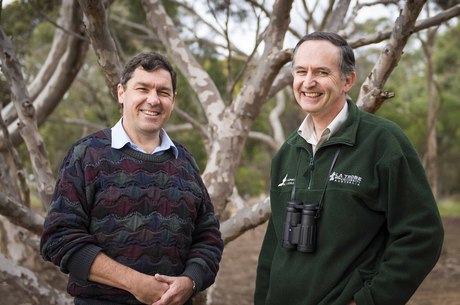Balancing fire management and conservation

Victorian environmental scientists have collected one of the world’s largest datasets on wildfires, transforming our understanding of how fire affects biota and contributing to changes in fire policy.
The Mallee Fire and Biodiversity Project was a four-year collaborative project that was jointly led by Associate Professor Mike Clarke (La Trobe University) and Professor Andrew Bennett (Deakin University). The project aimed to identify the properties of habitat mosaics produced by fire that enhance the persistence and status of a broad range of taxonomic groups in eucalypt-dominated mallee (semi-arid) habitats.
Fire can affect vegetation for a century and more — and animals display distinct responses to fire that can last for a similar period. According to Professor Bennett, “We found that fire sets in train long-term changes in the structure of mallee vegetation, which can influence the habitat of animal species for similar periods.
“[Our research] showed that if the former policy of burning 5% of public land annually had continued, there would be severely detrimental effects for threatened fauna — such as the mallee emu-wren and black-eared miner.
“We proposed that the focus for managing fire at the landscape and regional scale should shift from that of simply creating a diversity of fire ages, per se, to determining the ‘best mix’ of age classes to conserve fire-sensitive species.”
The scientists have thus made a significant contribution to changing policy on prescribed burning in Victoria. Professor Bennett noted that the project has also contributed to “the next generation of fire ecologists, through the successful training of seven PhD students and several research fellows”.
The Mallee Fire and Biodiversity Team have now reached the finals of the 2016 Australian Museum Eureka Prizes, with their research shortlisted for the NSW Office of Environment and Heritage Eureka Prize for Environmental Research. The annual showcase of the best of Australian science will be held at the Sydney Town Hall on 31 August.
For the full list of finalists, visit http://australianmuseum.net.au/2016-eureka-prizes-finalists.
Rapid sensor can detect pregnancy complications sooner
Researchers have developed a rapid sensor that can detect pregnancy complications as early as 11...
New test could optimise preventive treatment for heart attacks
A simple scoring system could revolutionise how doctors prevent heart attacks and strokes by...
Selective combustion removes pollutants from industrial processes
Researchers have discovered how a catalyst can be used to selectively burn one molecule in a...




